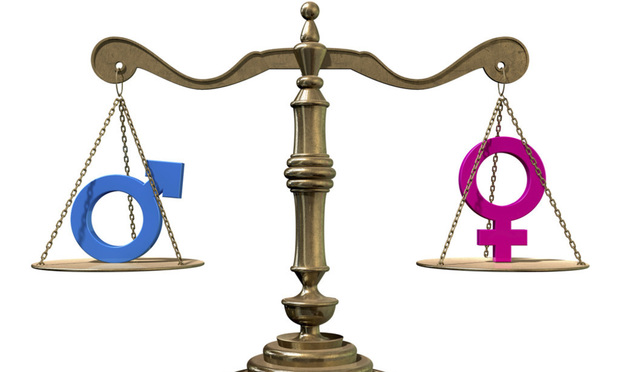Ninth Circuit Ruling on Salary History Fuels Renewed Focus on Gender Pay Gap
“Plaintiffs lawyers are taking notice,” a Seyfarth Shaw partner says. “Given the prominence of the #MeToo movement, this will certainly continue and increase risk for employers.”
April 12, 2018 at 04:17 PM
6 minute read

The federal appeals court ruling this week that said employers cannot consider prior salary in determining an employee's pay targets the growing tension surrounding gender pay disparity and forces companies to question long-held practices.
The U.S. Court of Appeals for the Ninth Circuit ruling fuels momentum to narrow the pay gap, led by state and local governments that are passing laws to ban employers from asking prospective employees about their prior salaries. Advocates say tactics such as considering salary history in determining pay and, later defending a disparity, perpetuate a cycle of inequity between women and men.
The Ninth Circuit en banc court's majority ruling was unequivocal in saying that a consideration of prior salary, whether alone or in a combination of factors, violated the Equal Pay Act. This could set up a Supreme Court battle, as the Seventh Circuit ruled the opposite way, and the Tenth and Eleventh circuits issued divergent but more nuanced opinions. The ruling came amid a call for greater transparency in light of the #MeToo movement and as companies from Silicon Valley to Wall Street square off in the courts over these issues.
“I see a direct link now to the #MeToo movement,” said Stephen Hirschfeld, founding partner and co-manager of San Francisco's Hirschfeld Kraemer. “Pay equity is just one of several issues that deal with workplace respect, harassment and promotional opportunities. They are all interrelated. Employers need to think about what this ruling says, what the state laws are indicating and how this perpetuation of income inequality can be stopped.”
Hirschfeld said he already advises clients to not ask about prior salary and to go a step further and conduct pay equity audits. “The more you can do to get ahead, not necessarily just avoid lawsuits, but also to create a fair playing field in the workplace,” he said.
➤➤ Get employment law news and commentary straight to your inbox with Labor of Law, a new Law.com briefing. Learn more and sign up here.
Companies facing these complex realities are reckoning with the new focus in different ways. Shareholders are calling for more transparency and better training. Some have taken the step to do voluntary pay audits or released pay data. Seyfarth Shaw attorneys, speaking on a webinar this week, said understanding pay discrepancies isn't always clear-cut.
Matthew Gagnon, a Chicago-based Seyfarth Shaw labor partner, said employers should be aware there is a growing sense that the use of prior salary history is not a defense by itself because it would perpetuate the wage discrepancy between men and women.
Class actions were recently cleared to move forward against Google Inc. and another against Goldman Sachs. In the Google case, the court specifically cited the companywide policy of considering previous salary history. The lawyers for the employees—represented by Altshuler Berzon and Lieff Cabraser Heimann & Bernstein—said the court's decision could provide a blueprint for other cases around the country.
“Plaintiffs lawyers are taking notice,” Gagnon said. “Given the prominence of the #MeToo movement, this will certainly continue and increase risk for employers.”
Differences in pay can be explained by factors other than sex, said Camille Olson, an employment partner in Seyfarth's Chicago office and co-chairwoman of the firm's national complex litigation team.
“You have to be able to show your compensation and the factors you are using for differential pay is necessary to hire and retain employees in the job,” Olson said. “That's the concept of business necessity.”
The full practical consequences of the Ninth Circuit's decision won't be known for some time.
Several judges on the Ninth Circuit panel warned, in concurrences, that the ruling could go too far. Judge M. Margaret McKeown charged that the majority's opinion “effectively bars any consideration of prior salary in setting a new salary.”
Companies are concerned about keeping records and adjusting what is a “comparable job” when determining scale, said Megan Winter, a Fisher & Phillips partner in San Diego.
“It has been a common business practice to use prior compensation as one factor. Under the ruling, even using it in conjunction with other factors won't be allowed,” she said. “For multistate employers, it creates a patchwork of obligations and whether they can use it as a factor in hiring.”
Annette Tyman, a Seyfarth Chicago-based employment attorney, said employers need to focus on job descriptions and the actual work being performed being outlined clearly. If a certain title has a wide scope and range of responsibilities, that should be addressed and explained clearly.
“Look at compensation but be proactive within the infrastructure of the company, including promotion policy and how do you set starting salary,” she said. “Those factors are changing and evolving. Always talk about the data gap.”
Measures to Enforce Pay Data Transparency Stall
A measure in California to require large companies to report pay data was vetoed by the governor. It mirrored a federal measure that was scuttled by the Trump administration's budget office before it could take effect. The U.S. Equal Employment Opportunity Commission, however, has said equal pay is a top issue.
This week, in recognizing Equal Pay Day on April 10, current EEOC chairwoman Victoria Lipnic said the agency continues to see pay practices that disregard the concept of equal pay for equal work. She touted that the agency has resolved more than 5,000 charges alleging pay discrimination and recovered $40 million through the administrative process and through litigation in the last two years.
The Ninth Circuit's decision was a major win for gender equality because company policies that ask about salary history essentially “bake in” the tendency to pay women less, said Debra Katz, the veteran civil rights lawyer at Washington's Katz Marshall & Banks.
“Employers don't want to overpay. They want to hire the talented people they want for the least amount of money they can. In asking about prior salary history, they are testing what this person would be willing to work for,” Katz said. “The fact is, if you are considering salary history, you are in effect considering a remnant of discrimination.”
This content has been archived. It is available through our partners, LexisNexis® and Bloomberg Law.
To view this content, please continue to their sites.
Not a Lexis Subscriber?
Subscribe Now
Not a Bloomberg Law Subscriber?
Subscribe Now
NOT FOR REPRINT
© 2025 ALM Global, LLC, All Rights Reserved. Request academic re-use from www.copyright.com. All other uses, submit a request to [email protected]. For more information visit Asset & Logo Licensing.
You Might Like
View All
'A Death Sentence for TikTok'?: Litigators and Experts Weigh Impact of Potential Ban on Creators and Data Privacy

Shareholder Democracy? The Chatter Musk’s Tesla Pay Case Is Spurring Between Lawyers and Clients
6 minute read

Many LA County Law Firms Remain Open, Mobilize to Support Affected Employees Amid Historic Firestorm
Trending Stories
- 1Paul Hastings, Recruiting From Davis Polk, Continues Finance Practice Build
- 2Chancery: Common Stock Worthless in 'Jacobson v. Akademos' and Transaction Was Entirely Fair
- 3'We Neither Like Nor Dislike the Fifth Circuit'
- 4Local Boutique Expands Significantly, Hiring Litigator Who Won $63M Verdict Against City of Miami Commissioner
- 5Senior Associates' Billing Rates See The Biggest Jump
Who Got The Work
J. Brugh Lower of Gibbons has entered an appearance for industrial equipment supplier Devco Corporation in a pending trademark infringement lawsuit. The suit, accusing the defendant of selling knock-off Graco products, was filed Dec. 18 in New Jersey District Court by Rivkin Radler on behalf of Graco Inc. and Graco Minnesota. The case, assigned to U.S. District Judge Zahid N. Quraishi, is 3:24-cv-11294, Graco Inc. et al v. Devco Corporation.
Who Got The Work
Rebecca Maller-Stein and Kent A. Yalowitz of Arnold & Porter Kaye Scholer have entered their appearances for Hanaco Venture Capital and its executives, Lior Prosor and David Frankel, in a pending securities lawsuit. The action, filed on Dec. 24 in New York Southern District Court by Zell, Aron & Co. on behalf of Goldeneye Advisors, accuses the defendants of negligently and fraudulently managing the plaintiff's $1 million investment. The case, assigned to U.S. District Judge Vernon S. Broderick, is 1:24-cv-09918, Goldeneye Advisors, LLC v. Hanaco Venture Capital, Ltd. et al.
Who Got The Work
Attorneys from A&O Shearman has stepped in as defense counsel for Toronto-Dominion Bank and other defendants in a pending securities class action. The suit, filed Dec. 11 in New York Southern District Court by Bleichmar Fonti & Auld, accuses the defendants of concealing the bank's 'pervasive' deficiencies in regards to its compliance with the Bank Secrecy Act and the quality of its anti-money laundering controls. The case, assigned to U.S. District Judge Arun Subramanian, is 1:24-cv-09445, Gonzalez v. The Toronto-Dominion Bank et al.
Who Got The Work
Crown Castle International, a Pennsylvania company providing shared communications infrastructure, has turned to Luke D. Wolf of Gordon Rees Scully Mansukhani to fend off a pending breach-of-contract lawsuit. The court action, filed Nov. 25 in Michigan Eastern District Court by Hooper Hathaway PC on behalf of The Town Residences LLC, accuses Crown Castle of failing to transfer approximately $30,000 in utility payments from T-Mobile in breach of a roof-top lease and assignment agreement. The case, assigned to U.S. District Judge Susan K. Declercq, is 2:24-cv-13131, The Town Residences LLC v. T-Mobile US, Inc. et al.
Who Got The Work
Wilfred P. Coronato and Daniel M. Schwartz of McCarter & English have stepped in as defense counsel to Electrolux Home Products Inc. in a pending product liability lawsuit. The court action, filed Nov. 26 in New York Eastern District Court by Poulos Lopiccolo PC and Nagel Rice LLP on behalf of David Stern, alleges that the defendant's refrigerators’ drawers and shelving repeatedly break and fall apart within months after purchase. The case, assigned to U.S. District Judge Joan M. Azrack, is 2:24-cv-08204, Stern v. Electrolux Home Products, Inc.
Featured Firms
Law Offices of Gary Martin Hays & Associates, P.C.
(470) 294-1674
Law Offices of Mark E. Salomone
(857) 444-6468
Smith & Hassler
(713) 739-1250






